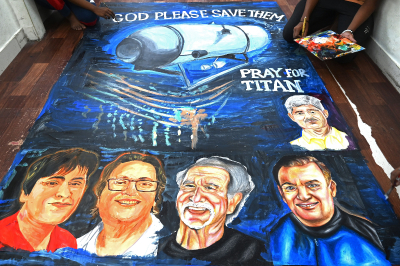What can we learn from the Titan tragedy?

We all are deeply saddened by the tragedy of the Titan submersible craft with five people aboard. We hoped they somehow might have survived, but then discovered they had been gone for some time, due to what was described as a “Catastrophic implosion.”
James Cameron, director of the film "Titanic" and expert in submersibles, stated that the trip was fraught with peril from its outset, even saying the journey had parallels with Titanic where the captain repeatedly ignored warnings about an incoming iceberg and carried on at top speed.
When photos emerged of the interior of the 22-foot submersible, which was about the size of a mini-van, it was shocking to see there were no chairs and Ziploc bags for toilets.
It also had a video game controller to navigate with.
The price of being a part of this trip two miles beneath the surface of the ocean to visit the legendary Titanic shipwreck was $250,000 per person. Needless to say, only the very wealthy need apply.
Among those on board the Titan submersible was British billionaire Hamish Harding, 58, who made his fortune selling private jets and holds three Guinness World Records for past extreme trips; British-based businessman Sharhzada Dawood, 48, and his 19-year-old son, Suleman. It was especially heartbreaking to read that Suleman was terrified of boarding the small Titan submarine in the first place, but according to his aunt, he did so because the trip fell over Father’s Day weekend and he wanted to please his dad, who was passionate about the lore of the Titanic.
We wonder why these intelligent, successful, and very wealthy people would undertake such a journey so laden with risk, to begin with.
Dr. Scott Lyons, a psychologist whose clients include some of the world’s wealthiest people, told The Daily Mail that new technologies have made it possible for rich people to chase increasingly dangerous thrills. They can book passage of flights to space or board a submarine for $250,000.
Dr. Lyons said: “People will do more thrill-seeking if they're susceptible to boredom. As you get more extravagant in life, things become less exciting. You're looking for the novelties of life as things become so available to you.”
The adventures offer a “sense of aliveness,” he said. “If there's safety in some parts of their life like finances, where it doesn't feel so risky, they might seek the thrill and the risk in other places.”
Boredom. This is nothing new.
Thousands of years ago, the wealthiest man of his time, King Solomon, did something similar.
He could not rocket to space or dive into the depths of the ocean, but he sampled every pleasure available and found it all empty.
Solomon wrote, “I said to myself, ‘Come on, let’s try pleasure. Let’s look for the good things in life.’ But I found that this, too, was meaningless’” (Ecc. 2:1).
Some things just don’t change.
A new film is coming out on the life of J. Robert Oppenheimer, directed by Christoper Nolan. Oppenheimer was a brilliant physicist and head of the Los Alamos Laboratory, which developed the atomic bomb. He also directed the Institute for Advanced Study in Princeton, New Jersey. Yet the year before he died, he said this about his accomplishments: “They leave on the tongue only the taste of ashes.”
We celebrate our dramatic advances in science and technology, and they are breathtaking, to say the least. We live in a technologically advanced age, and we truly have become a global village. Still, it seems that all this technology has numbed our souls a little bit more. That’s because we have pursued knowledge without God.
You don’t have to rocket to space or explore the depths of the ocean to find what you are looking for. It’s right in front of you. Or should I say, HE is right in front of you.
His name is Jesus Christ.
The Psalmist writes, “If I climb to the sky, you’re there! If I go underground, you’re there! If I flew on morning’s wings to the far western horizon, You’d find me in a minute — you’re already there waiting!” (Ps. 139).
What we really are looking for deep inside is a relationship with God. No material thing will fill that space. Nor will any experience, no matter how exotic.
May the “God of all comfort” be with those who lost loved ones aboard Titan. I prayed those on board called on the Lord and if they did, I know the Lord heard them. The Bible says, "Whoever will call on the name of the Lord will be saved” (Rom.10:13).
That is true for all of us, wherever we are.
Greg Laurie is the pastor and founder of the Harvest churches in California and Hawaii and Harvest Crusades. He is an evangelist, best-selling author and movie producer. “Jesus Revolution,” a feature film about Laurie’s life from Lionsgate and Kingdom Story Company, releases in theaters February 24, 2023.




















